GET IN TOUCH
- Please wait...
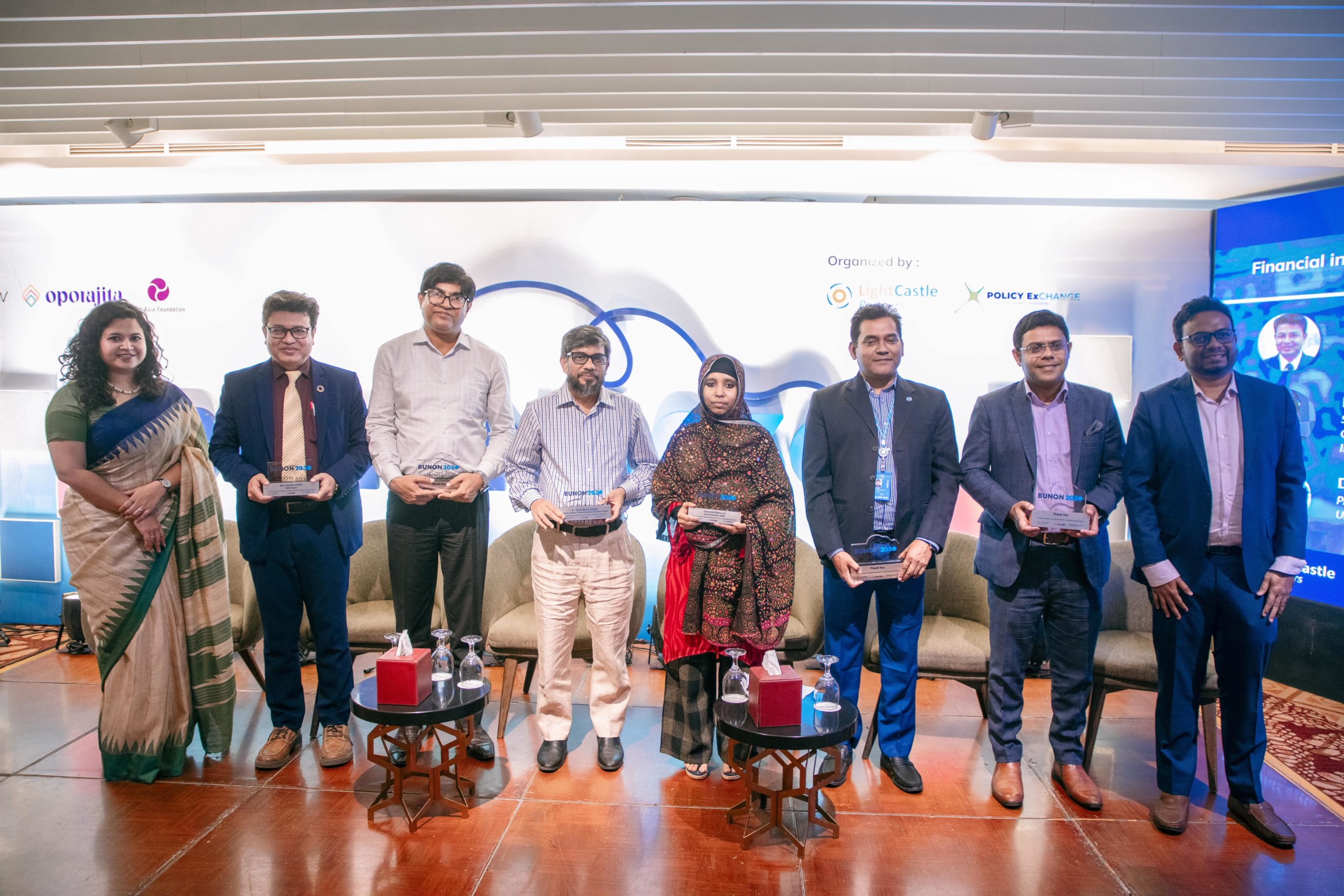
The apparel sector plays a crucial role in Bangladesh’s economy, accounting for a significant 84.5% of the country’s exports and employing around 4.6 million workers, with 60% of them being women. Despite the undeniable contribution of women to the sector, the effective implementation of their rights faces numerous obstacles. The competitive dynamics of the market and the increasing impact of automation in the garment industry raise concerns among workers about potential job insecurity.
In light of these challenges, there is an urgent call for a comprehensive examination of the rights and welfare of women working in Bangladesh’s apparel sector. The evolving economic and technological shifts in the industry make it imperative to develop immediate action plans. These plans are crucial to safeguard women from unfair treatment and ensure their well-being in the dynamic landscape shaped by automation.
The adoption of AI and automation, as indicated by McKinsey, is anticipated to impact approximately 15% of the global workforce. This technological shift has the potential to replace low-cost labor with increased accuracy and efficiency. In the context of the garment industry, this transition is compounded by global challenges related to sustainability and the well-being of workers.
In Bangladesh’s garment sector, gender-based task distribution is a prevailing practice, influencing the working conditions for women employees. The sewing department, for instance, is predominantly staffed by women, while men are more commonly employed in cutting, ironing, and finishing roles. Women typically hold positions as helpers, machinists, and, less frequently, as line supervisors and quality controllers. Notably, female cutting masters are scarce in Bangladesh’s apparel sector.
In Bangladesh, women’s participation in the apparel sector has seen a gradual decline from 58.4% in 2015 to 53.7% in 2021. Many of these women who are no longer part of the workforce are expected to take on roles as homemakers or primary caregivers within their families, reflecting prevalent social and gender norms. These norms serve as a deterrent for women to enter formal workplaces, raising concerns about women’s participation in the formal workforce.
Moreover, the prevalence of workers’ rights violations in local manufacturing factories, particularly affecting women workers, is a pressing issue exacerbated by factors such as extreme poverty and entrenched gender norms. Addressing these gender-specific job allocations and ensuring the well-being of women in the dynamic landscape of automation is crucial for promoting job satisfaction, reducing turnover and absenteeism, and enhancing worker productivity.
Leveraging the insights gained from the landscape assessment of the apparel ecosystem, LightCastle Partners conducted a second policy dialogue event in mid-February 2024. This event, integral to the Bunon 2030 initiative, centered on pivotal themes such as Worker Wellbeing, Financial Inclusion, and Skills Enhancement. It provided a significant platform for industry leaders, policymakers, development partners, innovators, and academics to come together and explore the intricate challenges associated with the imminent transformations within the apparel industry.
The dialogue series is part of Bunon 2030, a dedicated initiative aimed at empowering women garment workers in Bangladesh. This dialogue event encompassed discussions on enhancing worker well-being, exploring opportunities for reskilling and upskilling to mitigate automation risks, and addressing concerns related to the career advancement of female apparel workers.
Bunon 2030 operates with support from the H&M Foundation and The Asia Foundation, serving as a core component of the “Oporajita: Collective Impact on the Future of Work in Bangladesh” initiative. This collaboration aims to collectively ensure the future livelihoods of women garment workers in Bangladesh, emphasizing a shared objective of safeguarding their economic prospects and well-being.
According to the definition provided by the International Labour Organization (ILO), worker wellbeing encompasses various dimensions. It includes ensuring the physical safety of factories, fair wages, reasonable working hours, opportunities for training and career advancement, freedom from harassment and discrimination, and the creation of a supportive work environment that contributes to mental well-being.
This comprehensive perspective emphasizes not only the physical aspects of safety but also factors that contribute to the overall welfare and development of workers. Workers’ well-being can be broadly disaggregated into five major factors. The five pillars for well-being are determined as Access to a Safe and Healthy Environment, Good Health and Nutrition, Economic Empowerment, Equality, Acceptance and Social Rights, and Education and Professional Development.
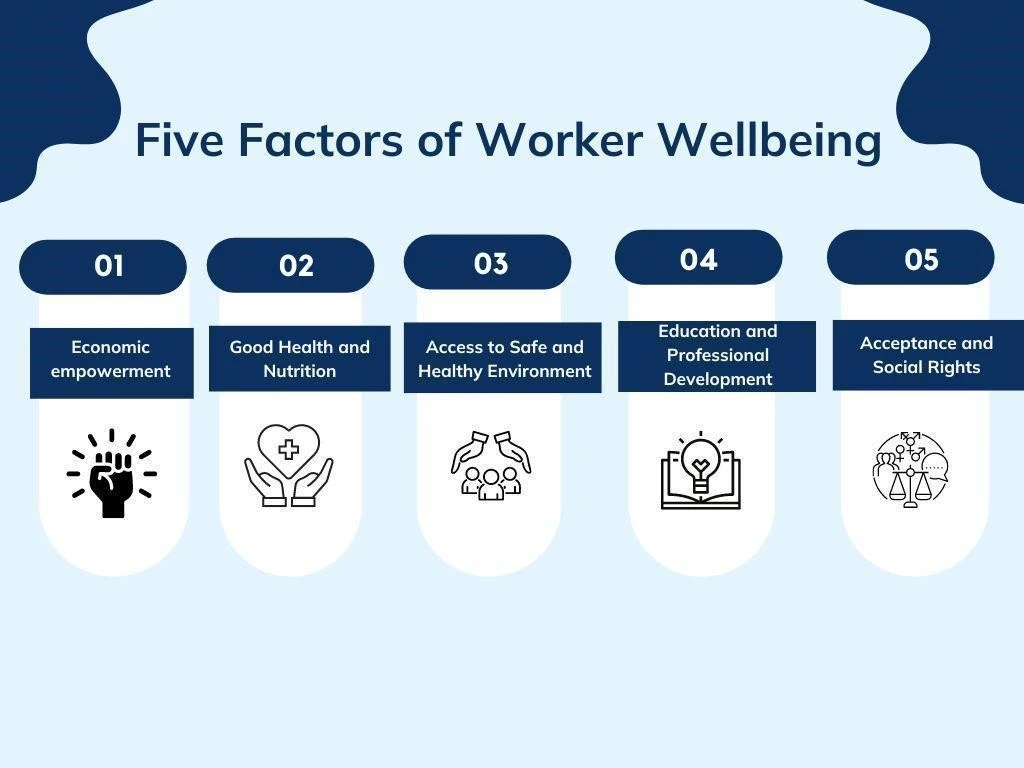
Figure 1: Five Pillars of Worker Wellbeing
To illuminate the key facets of workers’ well-being and explore strategies for enhancing health and safety, the panel assembled a group of industry experts and influential figures from both the apparel sector and workers’ welfare domain. The panelists included Dr. Julia Ahmed, an independent consultant, Sirajul Islam Rony, president of Bangladesh National Garments Workers Employees League (BNGWEL), Amer Salim, director of Knit Asia, and Dr. Mehruna Islam Chowdhury, business and human rights specialist from United Nations Development Programme (UNDP).
This diverse panel brought together perspectives from various stakeholders to address the multifaceted aspects of workers’ welfare. The discussion centered on the fundamental human rights of workers within the apparel sector, focusing on the challenges and the necessity of raising awareness among them. Panelists underscored the importance of a collaborative approach involving industrial leaders and policymakers to establish regulations for working conditions and develop sustainable solutions for the mental and physical well-being of workers. The panelists delved into critical areas which have been discussed in the following points.
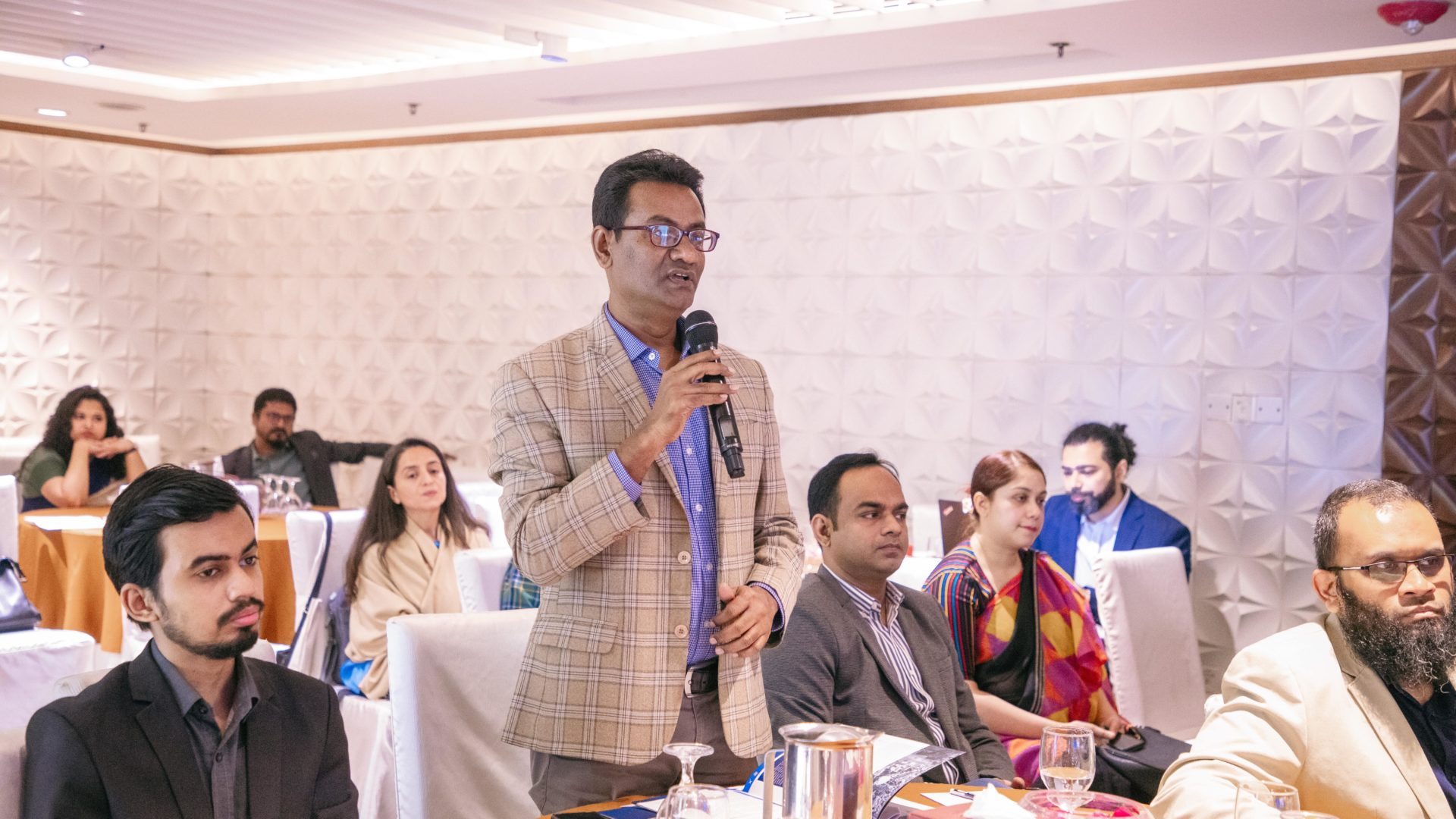
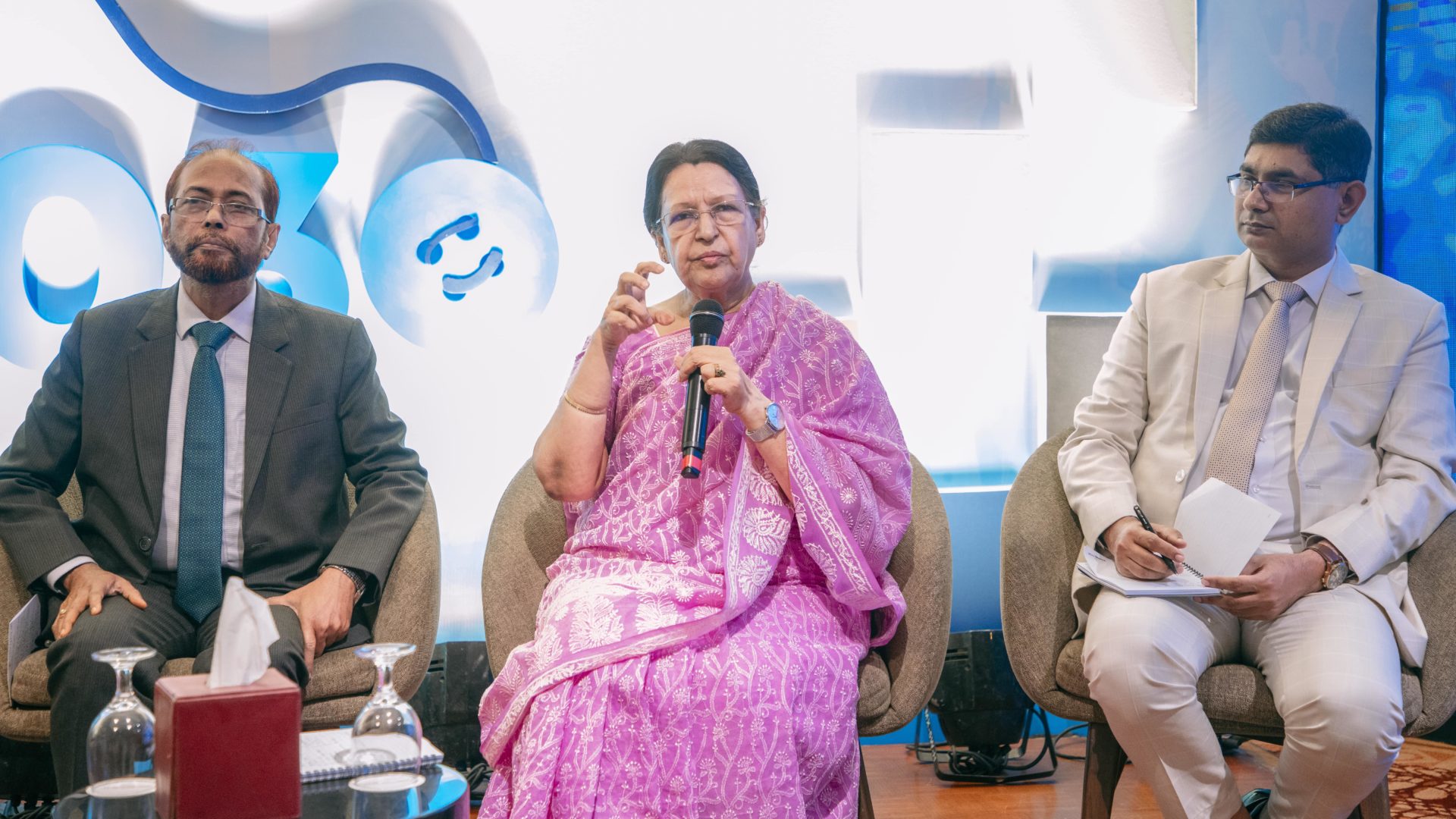
Worker Health – A large percentage of female blue-collar workers in Bangladesh lack access to basic healthcare, hygiene, and reproductive health services. Various factors contribute to this, including social barriers, inadequate infrastructure, challenging working conditions, and a reluctance to openly discuss these issues. Prioritizing the health of workers is crucial for cultivating a productive workforce within the apparel sector. These entails addressing specific concerns such as menstrual health management, reducing the risks of unwanted pregnancies, and mitigating reproductive allergic reactions resulting from unhygienic working environments.

Figure 2: BGMEA Operates 12 Health Centers for Provision of Free Health Care Services
Safe Working Environment – In Bangladesh, the minimum wage in manufacturing sectors like garments and textiles has long been criticized for its inadequacy in meeting the rising cost of living. Despite efforts to address this issue, the recent adjustment in 2023 only increased the minimum wage from BDT 8,000 to BDT 12,000 per month, falling short of providing substantial relief to workers.[1]
Additionally, a significant gender wage gap persists, particularly within small and medium enterprises (SMEs). Despite claims of equal pay for employees regardless of gender by many factories, unsafe working conditions continue to serve as a barrier for women to pursue higher-level job responsibilities within the apparel industry.
Social Rights – Finally, the panel emphasized that challenges such as prolonged working hours and inadequate childcare facilities greatly hinder women workers’ prospects of securing a better future in the formal workforce. While certain manufacturers have implemented childcare facilities in their factories, many of these facilities are non-functional in practice, exacerbating the problem for women employees.
A survey conducted by UNICEF in 2018 found that a staggering 97% of female garment factory workers do not have access to daycare services for their children. Surprisingly, the survey also revealed that nearly 70% of respondents preferred their children to be cared for by grandparents instead.
Moreover, the panel put forward that Bangladeshi law mandates garment factories with over 40 employees to provide daycare facilities for children aged between 0 to 6 years. To summarize the discussion of basic rights, the panel recommended some noteworthy suggestions to integrate fair rights for these women workers in the apparel sector.
Examining the financial circumstances of female workers in the apparel industry, reveals obstacles in accessing formal financial institutions due to stringent documentation requirements and limited financial literacy.Delving deeper into the conversation on workers’ financial condition, the next panel underscored the importance of enhancing financial literacy among women employed in the apparel sector.
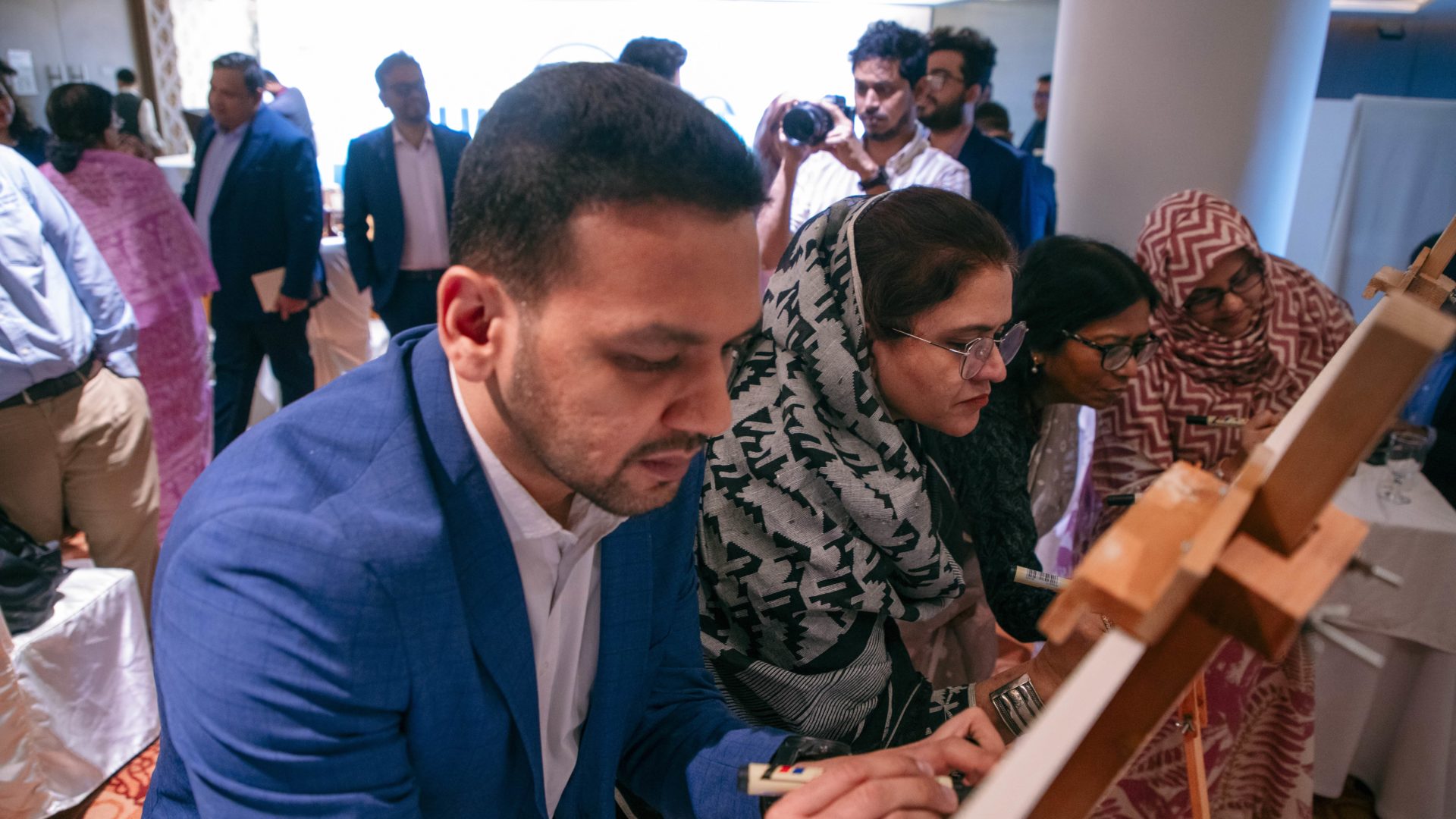
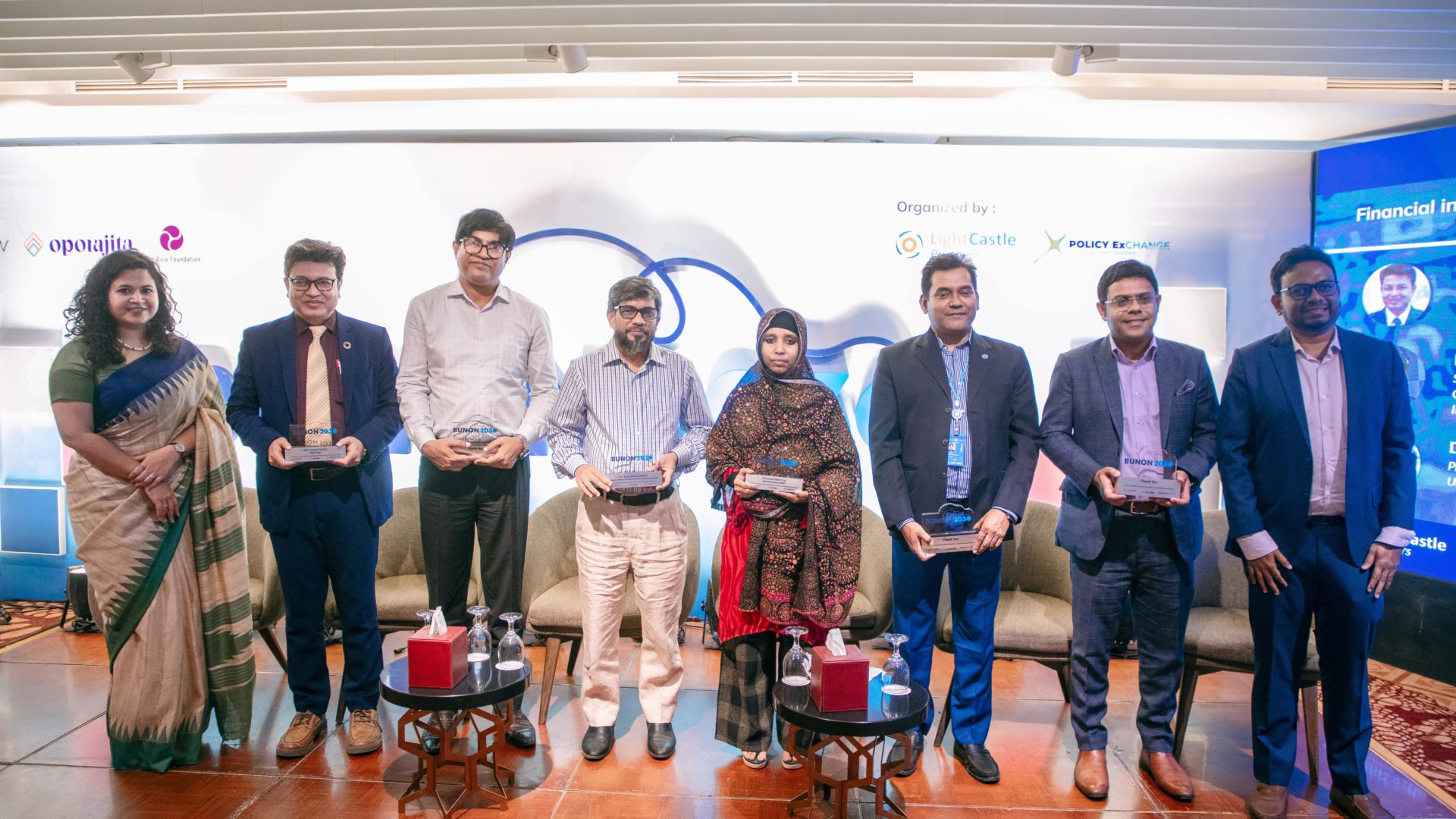
The panel, consisting of academics, industry leaders, and development partners; MD. Jamal Uddin, RMG Expert, Tahmina Rahman, general secretary from Bangladesh Apparel Workers Federation (BAWF), Dr. Mohammad Shamsul Hoque, senior enterprise advisor from International Labour Organization (ILO), Md. Ayub Ali Sarker, senior specialist of Underprivileged Children’s Educational Programs (UCEP), Dr. Syed Abdul Hamid, professor of Dhaka University (DU), and Hedayatul Basher, head of corporate sales from Nagad, shed light on the critical need for empowering these workers with the knowledge and skills necessary to navigate the financial landscape effectively.
To be able to navigate the financial landscape, there is a prerequisite for financial literacy. Around 17% of women faced challenges in utilizing their new digital payroll accounts due to a lack of training, while 29% found the process of using digital accounts to be extremely complex.[1]
The panelists acknowledged that Bangladesh’s garment sector is gradually transitioning to digital payments, although many factories still primarily use cash for wages and other payment systems due to the lack of digital financial literacy. Financial services should be integrated to enable workers to gain insights into saving or managing money, obtaining loans, and purchasing insurance products, thereby promoting financial literacy and autonomy over their salaries.

Figure 3: Empowering RMG Women Workers Through Financial Literacy
Initiatives can be taken such as the collaboration between MFS service providers and financial institutions to provide unbanked workers with collateral-free digital loans at a lower interest rate.
Such measures aim to empower women workers to make informed choices and prevent potential abuse of power by their spouses, mitigating the risk of fraudulent activities associated with informal savings methods.
Despite the challenge posed by the advent of Industry 4.0 and the potential automation of production processes, panelists underscored a concerning projection of 60% of garment workers in Bangladesh could face unemployment in the RMG sector by 2030-2041. Given that a significant portion of these workers are women, particularly concentrated in sewing roles, the impact of automation stands to disproportionately affect them.
To empower these women and mitigate the risks associated with automation-induced job losses, it is imperative to prioritize their financial literacy and offer reskilling and upskilling programs. Equipping these workers with the necessary financial knowledge not only enables them to make informed decisions about their earnings, but also facilitates their participation in training sessions aimed at enhancing their skills and transitioning to new roles or industries.
There was further emphasis on promoting financial inclusion among RMG workers through formal savings avenues to foster economic empowerment and stability within the sector. By providing women with access to formal financial mechanisms, such as savings accounts, they gain opportunities to invest in entrepreneurship ideas and potentially start their own businesses.
The future success of Bangladesh’s Ready-Made Garment (RMG) sector is intricately linked to the productivity of its workers. While the sector has shown significant growth in the past decade, positioning itself to become the world’s second-largest exporter, there remains room for improvement in terms of productivity compared to global counterparts.
Recent data from the Asian Productivity Organization (APO) highlights that Bangladesh trails behind its South Asian counterparts in labor productivity, with a rating of 10.4 (APO Productivity Databook 2020). Additionally, the country falls short in value creation during apparel production, generating approximately 3.10 USD/M2, notably behind competitors like Vietnam and India.
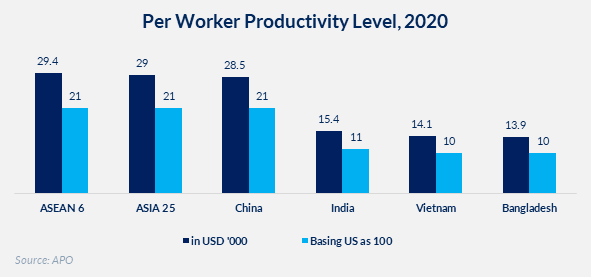
Figure 4: Per Worker Productivity
Furthermore, automation poses a significant challenge, with garment workers in Bangladesh at risk of unemployment due to adoption of automation in the production of apparel. To address this potential threat and safeguard women workers, collaboration among garment manufacturers and policymakers is essential. Dr. M Masrur Reaz, Chairman of Policy Exchange, moderated a panel discussion titled “Developing a Productive Workforce to Ensure Competitiveness of the RMG Sector.”
The panel featured influential industry leaders and policymakers, including Asif Ibrahim (Vice Chairman, Newage Group), Md Fazlul Haque (Managing Director, Plummy Fashion Ltd), Ferdaus Ara Begum (CEO, BUILD), Dulal Krishna Saha (Former Executive Chairman, NSDA), and Md Selim Hossain (Deputy Secretary, Ministry of Commerce).
Contrary to conventional concerns about job displacement, the panelists emphasized that automation could be viewed not as a threat, but as a catalyst for new opportunities within the sector.
However, achieving this transformative shift requires a greater emphasis on growing the supply of multi-skilled, technically proficient professionals and experts. The existing workforce’s adaptability to advanced technology was identified as a critical challenge, leading both industry leaders and policymakers to stress the need for improvement in upskilling and reskilling of female workers to enhance overall productivity.
Mr. Asif Ibrahim highlighted that economic challenges, such as inflation and a shortage of US dollars, have impacted the operational efficiency of RMG industries. He suggested a push to improve overall productivity and noted a persistent mismatch between industry requirements and the skills imparted through training programs, despite the Bangladesh Garment Manufacturers and Exporters Association (BGMEA) operating over 20 training centers nationwide.
This underscores the necessity to transition from supply-driven to demand-driven training programs, a point reinforced by other panelists.
Dulal Kirsha Saha highlighted that The National Skills Development Authority (NSDA) has taken a leading role in addressing this gap. Their five-year action plan prioritizes the incorporation of demand-driven training methodologies. The ongoing pilot phase of the National Skills Portal aims to catalog the evolving needs of industries and training offerings, providing a comprehensive understanding of the workforce’s demand and supply dynamics.
Collaborative efforts, such as the Skills for Employment Investment Program (SEIP), involving experts from Sri Lanka and H&M, aim to enhance training transparency by facilitating a comprehensive database of training-related information.
Furthermore, the panelists all emphasized that the absence of soft skills, especially among women workers, poses a significant hurdle for their career progression. Some organizations have initiated women’s leadership programs, such as Shimmy Technologies and Quizrr, providing reskilling and upskilling opportunities.
These programs serve as models for other garment factories, ensuring a sustainable pool of skilled workers within the industry. The aim is to build workers’ confidence, prepare them for higher positions, and empower them to address workplace issues. Lastly, the focus is on aligning women workers with suitable roles through skills development and enabling their participation in supervisory roles.
Furthermore, the panelists also highlighted that there needs to be a shift within the industry towards export diversification. Md Selim Hossain, Deputy Secretary of the Ministry of Commerce, emphasized there could be a transformative impact of incorporating high-value-added products into Bangladesh’s export portfolio, envisioning not only heightened global competitiveness, but also the creation of opportunities for women in more rewarding and sustainable roles.
The emphasis on better quality products within the export basket is deemed crucial for enhancing Bangladesh’s standing internationally. The RMG sector is actively spearheading the introduction of more intricate products and value-added services, including garments made from synthetic fibers, complex items like outerwear, and innovative techniques such as prints, washes, and laser finishings.
This diversification strategy not only positions Bangladesh for increased integration into the vertical supply chain, but also fortifies its global competitiveness, while minimizing susceptibility to demand-driven shocks. This strategic focus on product inclusion would become instrumental in fostering a thriving and inclusive garment industry, promoting the growth of career opportunities for women workers.
Alongside the National Skills Portal, the panelists believe that this initiative prioritizes demand-driven training methodologies, intending to bridge the gap between industry demands and the skills available in the workforce. This comprehensive approach not only enhances competitiveness but also mitigates the impact of demand-driven shocks, especially in response to new regulations mandating the use of automation for producing high-quality products.
The event concluded with insightful remarks from Kazi Faisal Bin Seraj, the Country Representative of The Asia Foundation. He highlighted the significance of dialogues involving diverse stakeholders within the apparel industry and stressed the need for collaborative action to ensure the future well-being of workers in the sector.
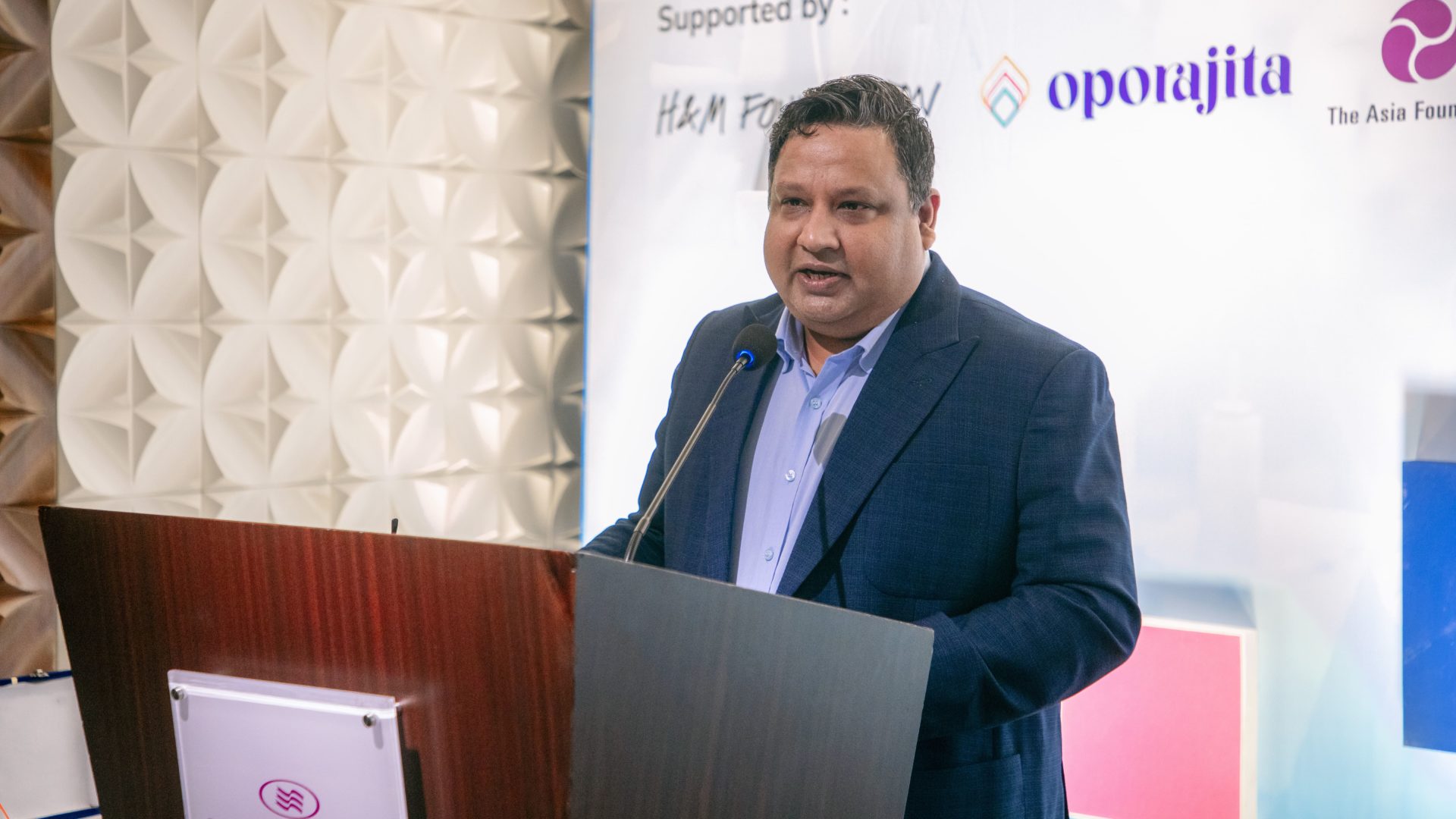
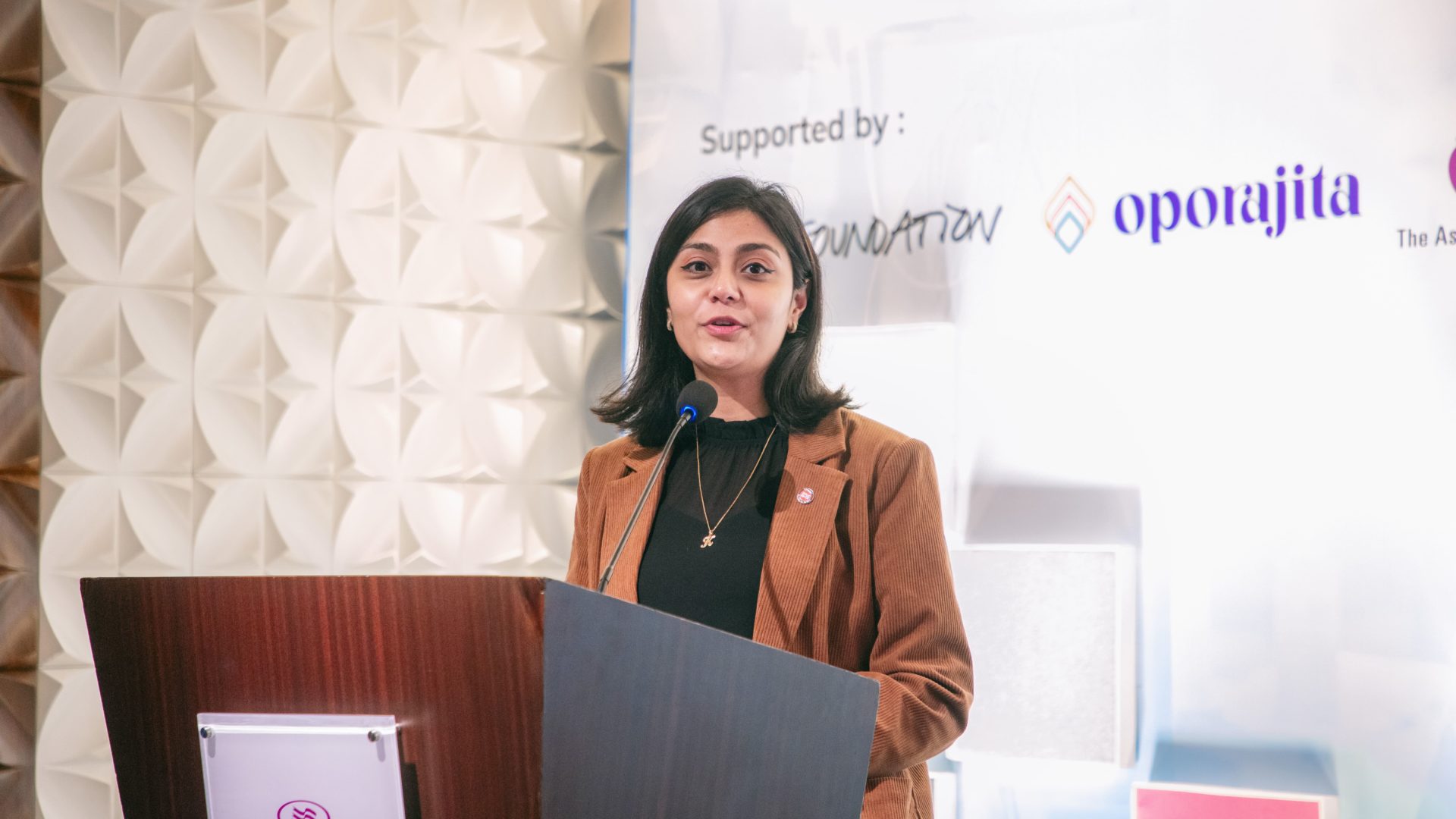
Emphasizing the importance of a united approach, he urged participants to actively engage in creating a more sustainable future for the apparel industry in Bangladesh. As a symbolic commitment to this shared goal, attendees were encouraged to sign a pledge under the Bunon 2030 initiative, solidifying their dedication to working together towards the betterment of the industry and the overall welfare of its workforce.
This call for collaboration and collective responsibility reflects a commitment to fostering positive change and resilience within Bangladesh’s apparel sector.
Our experts can help you solve your unique challenges
Stay up-to-date with our Thought Leadership and Insights